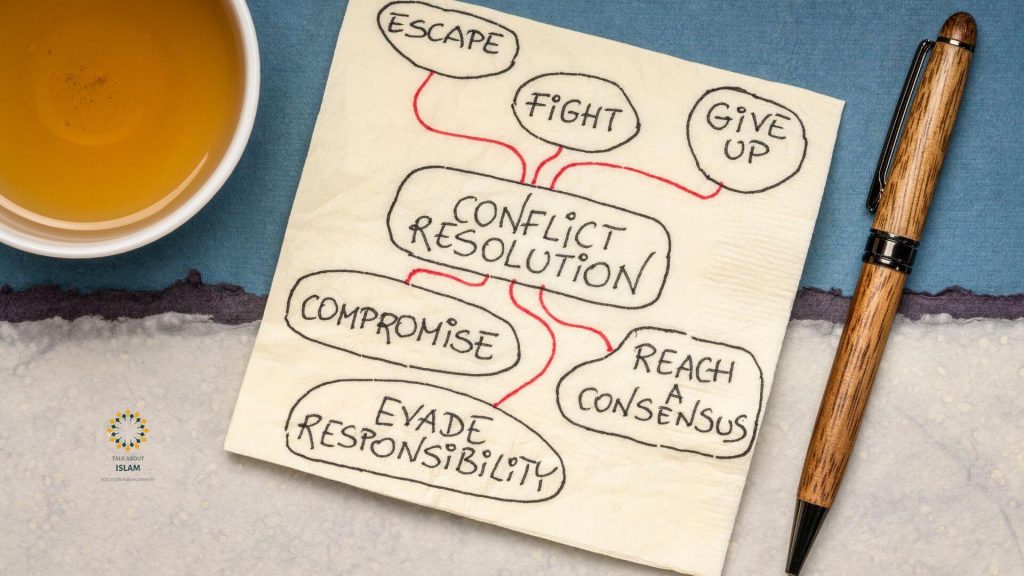Conflict shows up everywhere, like at home, at work, online, and between communities. Islam doesn’t pretend disagreements will disappear, but it teaches people how to face them with justice, calm, and care. At heart, dispute resolution in Islam is built on three pillars: truth, fairness, and reconciliation. The goal is not to crush the other side, but to repair what is broken with dignity for everyone involved.
Foundations From the Quran
The Quran asks people to stand firm for justice even if it is against themselves or those they love (4:135). That means evidence before ego and facts before feelings. It instructs believers to make peace between those who fight, and if one party is clearly in the wrong, to support correction with fairness and restraint (49:9–10). Another powerful teaching is to repel hostility with what is better (41:34). In practice, that means lowering the temperature of the room: choose words that cool rather than inflame, and resist the urge to “score points.” The Quran also praises consultation in decision-making (42:38), reminding communities to involve the right people early so problems do not harden into long grudges.
The Prophet’s Conflict-Resolution Playbook
From family matters to tribal disputes, the Prophet’s approach was consistent: listen first, seek common ground, and encourage people to meet on fair terms. He welcomed third-party mediation, asked questions to clarify facts, and discouraged prideful language that boxed people into corners. He also warned strongly against stirring division and spreading rumors, because they poison trust. In short, he modeled a style that was firm on principles and gentle with people, an example that translates well into today’s homes, offices, and community boards.
A Simple Framework for Islamic Conflict Resolution
1) Pause and Cool Down.
Anger blurs judgment. Islam praises self-control and urges people to hold back when emotions run high (3:134). A brief pause for an hour, an evening, often prevents a week of damage.
2) Clarify the Facts.
Conflicts grow in the dark. Collect what actually happened, who was affected, and what evidence exists. The Quran ties justice to fair testimony and warns against acting on hearsay (4:135). When claims involve money or agreements, put things in writing and use witnesses so memory or pressure does not rewrite the truth (2:282).
3) Meet with Dignity.
Choose a neutral space. Open by recognizing the other side’s concerns. Agree on ground rules: one person speaks at a time; no interruptions; no name-calling. This sounds basic, but a respectful process is often half the solution.
4) Mediate Before You Arbitrate.
Mediation seeks a solution both sides can accept; arbitration imposes one. Start with mediation led by someone both sides trust, an elder, manager, counselor, or community figure. If that fails or a deadline looms, move to arbitration with clear terms.
5) Aim for Repair, Not Just a Result.
Islam values forgiveness and restitution, working together. An apology that names the harm and a concrete step to make things right such as refunds, repairs, a public correction, goes further than a signed paper with no change of behavior.
6) Record the Agreement and Follow Up.
Write the outcome in plain language, assign responsibilities, and set a date to review progress. This keeps good intentions from fading and gives both sides a dignified way to say, “We kept our word.”
Family, work, and community: applying the principles
At Home
Many family conflicts are not about ideology; they are about tone, timing, and expectations. Schedule conversations rather than arguing on the spot. Rotate who speaks first so one voice does not dominate. If privacy is needed, split the issues and deal with them in small, focused sessions. For marriages, involve wise, trusted relatives or counselors early, before resentment hardens.
At Work
The same ethics apply to teams and clients. Set clear scopes, deadlines, and decision rights so “misunderstandings” do not become moral battles. When disputes arise, move from email to a scheduled call; written threads often escalate faster than voices do. If there is a power gap, invite a neutral HR partner to ensure the weaker party can speak safely.
In the Community
Worship places, schools, and neighborhood groups sometimes fracture over personalities rather than principles. Use open agendas, published minutes, and term limits to reduce suspicion. Create a small, trained mediation panel that can step in early. Public shaming rarely fixes anything; private, structured conversations often do.
Bottom Line
Islamic conflict resolution is not a show of strength but a complete show of maturity. It asks people to be brave enough to face facts, fair enough to accept correction, and generous enough to rebuild trust when possible. Start small: cool off before you answer, put one agreement in writing this week, or invite a neutral person to guide the next hard conversation. Little acts of fairness, repeated often, turn disputes into lessons and communities into places where people feel safe, especially when they disagree.



